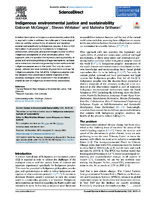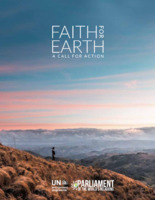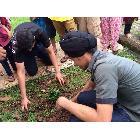Search
196 items
-
International Environmental Forum
The International Environment Forum, as a Bahá'í-inspired professional organization for environment and sustainability, shares and upholds the principles and ideals of the Bahá'í Faith and supports its efforts to establish and promote peace, the unity of the human race, and an ever-advancing world civilization that preserves the ecological balance of the planet.
The Bahá'í Writings warn of the dangers of material civilization carried to excess, enjoin moderation, emphasize the oneness of humankind, and support ecological principles such as the interrelatedness of all things, unity in diversity, and the fundamental reality of increasing levels of cooperation, complexity and reciprocity across the vast extent of creation. The Bahá'í Faith considers the preservation of the ecological balance at all levels in the world to be of vital concern to all humanity, and urges action for the environment and sustainable development from the local to the global level in ways that are in harmony with the rhythm of life in the community. Our inner life cannot be separated from the environment around us, the two being intimately interrelated, requiring that environmental and sustainable development issues also be addressed at the level of fundamental ethical and moral values and principles. -
A Bahá'í Compilation on Soil and Earth
This compilation gathers a selection of references to soil, earth and minerals in the Bahá'í Writings, including the ways these are referred to both symbolically and literally.
Contents:
Mineral Kingdom
Agriculture
Metaphorical Uses
Humility
Earth as Tomb
Rain on Soil
Fertile versus Barren
Cultivation - Divine Education -
The U.S. Baha'i Office of Public Affairs
The Office of Public Affairs for the Baha’is of the United States was founded in 1985 to represent the American Baha’i community on the national stage.
Today, we collaborate with governmental and non-governmental organizations, individuals, and groups to advance thought around our focus areas, which currently comprise racial unity & justice, the environment, economic justice, human rights, the role of media in society, and gender equality & the advancement of women.
Our Office operates under the auspices of the National Spiritual Assembly of the Baha’is of the United States, the elected governing body of the American Baha’i community. -
Indigenous environmental justice and sustainability
Current Opinion in Environmental Sustainability
Volume 43, April 2020, Pages 35-40 -
Sacred Watersheds and the Fate of the Village Body Politic in Tibetan and Han Communities Under China’s Ecological Civilization
Coggins studies the spiritual ecologies of Tibetan and Han communities in the People's Republic of China. The Tibetan animism focuses on the protection of landscapes because of their relation to various deities and spirits. Han communities worked on creating fengshui forests to find balance a balance of qi in all things. -
IRI Colombia continues far-reaching communications campaign to grow awareness on the importance of tropical forests
IRI Colombia continued its communications campaign to raise awareness about its mission and expand engagement in the 36 local chapters where IRI has a presence. IRI Colombia radio spots (which will run through the end of 2021) are being broadcast seven days a week on the country’s leading radio networks and will reach over 250,000 people. Listen to the radio spots in Spanish here.
IRI Colombia has also commissioned 10 billboards in strategic locations with messages like “Forest = water and oxygen” and “Plant a tree” to increase awareness about the importance of protecting and restoring tropical forests. The 36 IRI Colombia local chapters continue implementing their 2021 action plans, which include activities such as reforesting watersheds and springs, cleaning up riverbanks, and establishing tree nurseries. -
Interfaith Rainforest Initiative (IRI) Campaign Videos
The Interfaith Rainforest Initiative (IRI) creates artistic and well-produced videos that accompany their programs on climate change education and awareness-raising in branch offices around the world.
These videos are great resources for those looking for multimedia inspirations that amplify sustainability communications efforts. -
Faith for Earth: A Call for Action
This book was first published at the beginning of the twenty-first century. A joint project of the United Nations Environment Programme and the Interfaith Partnership for the Environment, it was titled Earth and Faith: A Book of Reflection for Action. The partners printed tens of thousands of copies and gave them to schools, congregations, and communities throughout the
world. The book described the growing threats to our planet’s life support systems, the reverence all faiths share for life on Earth, and the responsibility that people have to future generations. -
Zoom Events: Greening the Bible
The goal of this short course is to read the Bible afresh: to reinterpret texts of terror (for other creatures) and to reclaim passages that show the importance and agency of nonhuman persons. It is intended as a tool for forming earth-inclusive Christians. -
ECHO Global Farm
ECHO introduces sustainable plants, climate-resilient techniques, and technologies to farmers around the world who are struggling to feed their families.
Through partnering with local NGOs, farmers, volunteers, and missionaries, ECHO is able to be efficient with their resources in providing aid where it's needed the most.
Empty bellies and empty hearts lead to pain and suffering for individuals, families, and communities across the world. ECHO believes that as active participants in the Great Commission and stewards of great agricultural knowledge, it is their duty to grow and make disciples. -
Should Rivers Have Right? A Growing Movement Says It’s About Time
“Should Rivers Have Rights?," published through the Yale School of Environment, addresses not only the growing impact of river degradation but also the spiritual connection that indigenous cultures have with river systems around the world. Attributing legal rights to rivers and other bodies of water will contribute to their protection from further human pollution as well as restoration of these natural areas. Through legal policy, rivers can be brought back to a safe state of equilibrium while also being preserved for indigenous groups. -
Interfaith Rainforest Initiative Faith Toolkits
According to their website, The Interfaith Rainforest Initiative (IRI) "...is an international, multi-faith alliance that is working to bring moral urgency and faith-based leadership to efforts to end tropical deforestation." The IRI provides 8 unique "Faith Toolkits" to encourage the conservation of tropical forests and their inhabitants through guided reflections, prayers, meditations, lesson plans, and other teaching tools. Crafted to promote engagement with specific religions, the website provides kits for communities of the following faiths: Baha'i, Buddhism, Catholicism, Hinduism, Islam, Judaism, Evangelicalism, and Protestantism. -
Environmental Protection in Sikhism
In this article, Dr. Dalvinder Singh Grewal explains Sikhism's commitment to protecting humans and the environment, highlighting the organization "EcoSikh," a five-year plan created by the USA-based Sikh Council on Religion and Education (SCORE). In this article, Grewal also translates portions of Japuji, the Sikh sacred verse written by Guru Nanak, which describes an integral relationship between nature and God. This article helps readers from any religious background gain a deeper understanding of Sikhism and its connection to the environment. -
Conservation Good Turn
Conservation Good Turn is an article on the Boy Scouts of America website that describes the BSA's mission for conservation. As rooted in the Boy Scout tradition, conservation is an integral part of responsible citizenship. This article provides a general overview of scouting and its dedications, recognitions, and partnerships. -
Green the Church: On a Mission of Faith for Sustainability
Green the Church: On a Mission of Faith and Sustainability is an article by Betsy Lopez-Wagner for the non-profit Earth Justice. The article details Green the Church's history and founding. Lopez-Wagner also brings into discussion the work that Green the Church is doing. -
American Jewish World Service- Land, Water, and Climate Justice: Story Collection
The American Jewish World Service compiled a website of their outreach stories from the US, Africa, Asia, Latin America, and the Caribbean. Reflections from work with Indigenous communities are included as well. The environmental activism showcased on their website also defend women and their crucial involvement with agriculture and the environment. From the website;
"We aid communities and movements organizing to protect the land, water and natural resources that people depend on for their survival".
More information on how to get involved is listed on their website. -
Bellwether Farm
Bellwether Farm is a Christian organization which applies Biblical principles of creation stewardship to land use sciences to provide hands-on environmental education to the public on responsible land use. Responsible land use benefits human society and the earth both physically and spiritually, and this beautiful farm offers programs that help to exemplify this principle. Bellwether Farm routinely partners with the Episcopal Diocese of Ohio to educate the members of its congregations on environmental stewardship. -
United Women in Faith- Climate Justice
All creation is God’s, and we are responsible for the ways in which we use and abuse it … God has granted us stewardship of creation. We should meet these stewardship duties through acts of loving care and respect.” (Social Principles, ¶160)
Protecting God’s creation and those who are disproportionately affected by global climate change is more than our belief; it is one of our core principles. -
Religion and Ethics Focused On Sustainability
Yale student Dieter T. Hessel elaborates on how religion could solve sustainability issues all over the world. Eco-justice characteristics and values challenge everyone, both individually and collectively. Many religious leaders do not act urgently on environmental matters, which keeps the United States fueling global warming. But, religious environmentalism is on the rise in recent years. Christian denominations and many spiritual groups have realized the importance of "caring for creation". -
Sikhism and Caring for the Environment in Practice
This article describes Sikh values and how they relate to Sikh environmental beliefs. The Sikhs believe that every man and woman, regardless of status or creed, is born with unalienable rights to happiness and liberty. This belief leads to the Sikh stance on environmental ethics, arguing that fighting climate change is a universal effort that can only be achieved with love and compassion for humanity in mind. -
Muslim Hands
"We have long been prioritising environmental sustainability in all our projects. Many of the people in the developing world suffer the consequences of our irresponsible and indulgent lifestyle choices so it is our responsibility to be aware of the environmental impact that our actions have on others.
At Muslim Hands, we believe in operating projects in partnership with communities to deliver effective support that works in harmony with the surrounding environment. This means working locally to find sustainable solutions to the problems that people face.
This can take many forms. Rather than flooding markets with foreign produce, we purchase food, clothes and other necessities in the vicinity, or as close by as possible which reduces the carbon footprint and also boosts business for local traders.
Rather than clearing land for farming, we encourage the planting of orchards to bind the soil and provide people with a natural, long-term income source. Instead of using generators to produce electricity on new builds we use solar energy to reduce CO2 emissions. And environment forms an important part of our school curriculum, ensuring that the green message is passed onto future generations." -
Quench Their Thirst
"Welcome to the Quench Their Thirst Fundraising Project!
Water is a basic necessity of life, yet millions of people around the world lack access to this essential resource. By setting up a fundraising page, you can make a difference and help quench the thirst of those who need it most.
The money you raise will build water wells, boreholes and water filtration plants in rural communities in Africa and Asia, where people currently have no choice but to walk for miles to collect dirty, contaminated water. This not only puts their health at risk, but also takes up valuable time that could be spent on education, work, or caring for family members." -
Saving India’s Rivers: Ecology, Civil Society, Religion, and Legal Personhood
"Abstract: In recent decades, India’s environment has been severely compromised by riverine pollution combined with large-scale dams and exacerbated by diversion for irrigation. Most prominent among the rivers so affected has been the Ganges and its tributaries in northern India, which for Hindus include the country’s most sacred bodies of water. This paper examines three campaigns opposing dam construction, arguably the most widely publicized and analyzed efforts of this kind since independence in 1947. One campaign was essentially secular with virtually no religious component, the second mostly secular with some religious support, and the third almost totally a religious initiative. In the end, only the third attained any real success, and that rested on circumstances unlikely to be replicated. The possibility that future campaigns of this scale can be taken up again appears remote. Meanwhile, riverine pollution has continued to increase everywhere despite massive governmental programs to reduce it. Theoretically, it would seem that environmentalists and Hindu devotees with their veneration of nature should be able to work in common cause to reduce pollution, but any large-scale cooperation seems unlikely between these two disparate realms. More recently an effort to protect rivers by endowing them with legal personhood enjoyed an initial success, holding the promise that lawsuits could be brought on behalf of a river against those polluting it. The paper concludes that while the legal personhood strategy is currently stalled, it offers the best chance for eventual success in attenuating riverine pollution. In the course of the paper, a comparative theoretical framework for assessing anti-dam protests will be tested." -
Green Muslims
"Green Muslims is a volunteer-driven 501(C)3 headquartered in the metropolitan Washington, DC, area working to connect Muslims everywhere to nature and environmental activism. We host educational, service, and outdoor recreational events and strive to serve as a bridge connecting the Muslim community with local climate action organizations." -
Creation and Climate Care Zine
"If I want to talk to my church about climate change, where do I begin? How does climate affect migration today? Why is climate justice also racial justice? In what ways can I take real climate action on my own, and with my community? If you’ve ever wondered about any of these things, we’ve got you covered, friend. We're proud to present the story of creation care and climate justice…all wrapped up in doodle-filled, colorful, action-packed CREATION & CLIMATE CARE ZINE.
This new resource is an easy and engaging way to learn, to jumpstart conversations on climate change, and finally to act together in order to heal and protect our common home -- whether you live in Texas or New York, whether you’re 13 or 83 or anywhere in between."

























